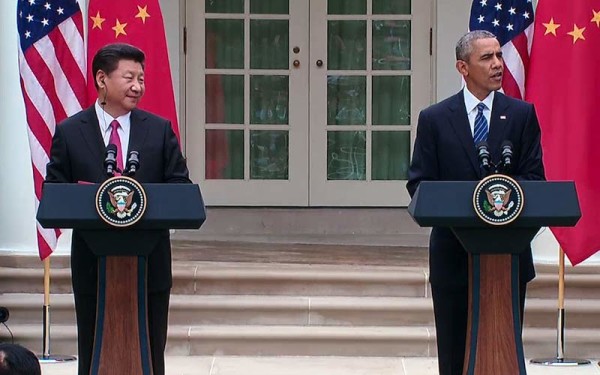
President Barack Obama and Chinese President Xi Jinping at their joint news conference on September 25, 2015 during which Obama raised the Tibet issue. (Photo: Official White House Photo)
On September 25, 2015, during a joint press conference at the White House with the visiting Chinese President, Xi Jinping, President Barack Obama urged China to engage the Dalai Lama and to preserve Tibetan identity, stating during his opening remarks: “Even as we recognize Tibet as part of the People’s Republic of China, we continue to encourage Chinese authorities to preserve the religious and cultural identity of the Tibetan people, and to engage the Dalai Lama or his representatives.”
President Obama said that during his discussion with Xi on human rights generally, he had affirmed America’s “unwavering support for the human rights and fundamental freedoms of all people, including freedom of assembly and expression, freedom of the press and freedom of religion.” Obama said he had “expressed in candid terms our strong view that preventing journalists, lawyers, NGOs and civil society groups from operating freely, or closing churches and denying ethnic minorities equal treatment are all problematic, in our view, and actually prevent China and its people from realizing its full potential.”
In his remarks during the joint press conference, President Xi said: “Democracy and human rights are the common pursuit of mankind. At the same time, we must recognize that countries have different historical processes and realities, and we need to respect people of all countries in the right to choose their own development path independently.”
During the past two months, thousands of members of the International Campaign for Tibet wrote to President Obama urging him to raise the following two issues with President Xi Jinping during Xi’s state visit:
- Seek justice for two Tibetan political prisoners: Investigate the death of Tenzin Delek Rinpoche and release Khenpo Kartse (Karma Tsewang), an abbot who is serving a 2.5-year sentence for allegedly “divulging state secrets” and has serious health issues.
- Stop the brutal repression of the Tibetan people: President Xi Jinping needs to address the underlying causes of the grievances of the Tibetan people and commit to an unconditional dialogue with envoys of His Holiness the Dalai Lama to arrive at a peaceful resolution to the Tibetan issue.
“We are glad that President Obama raised once again, and in public, the concerns of the US Government regarding the situation inside Tibet and the lack of dialogue by China with Dalai Lama or his representatives,” said Matteo Mecacci.
In July, the US House of Representatives unanimously passed a resolution calling on the US Government to strongly encourage representatives of the Government of the People’s Republic of China and His Holiness the Dalai Lama to hold substantive dialogue, in keeping with the Tibetan Policy Act of 2002 and without preconditions, in order to address Tibetan grievances and secure a negotiated agreement for the Tibetan people.
“The repeated calls from both the US and the European Union on China to find a political solution to the Tibetan issue, reflects the strong support of both the American and the European public. The oppressive policies implemented in Tibet are a reason of concern for the broader direction taken by China and they should be challenged by the international community,” concluded Mecacci.

